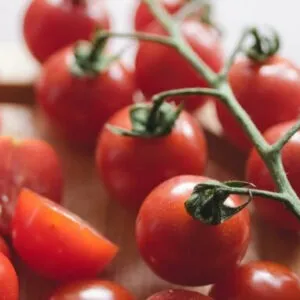Cherry Tomato Seeds (25 seeds)
Original price was: ₹70.0.₹35.0Current price is: ₹35.0.
Cherry tomatoes range in size from a thumb tip up to the size of a golf ball and can range from spherical to slightly oblong. Try our Non-GMO Cherry Tomato Seeds. Also, check out our workshops for more details.
PRODUCT DESCRIPTION
Number of seeds in a packet – 25
PLANT DESCRIPTION
- Difficulty Level – easy
- Plant Height – up to 120 cm
- Type – outdoor
- Feed – Vermicompost for nutrients every week, Seaweed once a month for greener leaves and Epsom salt for better blooming once a month
- Watering – every day
- Sunlight – full sunlight
- Germination Time – 1 week
- Fruiting Time – 7 – 8 weeks
- Harvesting Time – 12 weeks
- Suitable Temperature – 65°F – 85°F
- Season – all season except peak summer
HOW TO GROW CHERRY TOMATO FROM SEEDS
- Soak the seeds for 4 – 6 hours before planting.
- Take a Seedling Tray and fill it with Cocopeat.
- Make a hole double the size of the seed.
- Fill the hole with Cocopeat and spray with water using a spray gun or spray bottle.
- Keep the soil moist not soggy.
- Seeds will germinate within a week.
- Re-pot the sapling to a Medium Size Pot in 2 – 4 weeks.
- Full sunlight is needed.
ALTERNATE METHOD
- Take a Medium Size Pot and add a Potting Mix.
- If planting in the soil add Neem Cake Powder, Vermicompost, and Seaweed.
ALTERNATE NAME
Botanical name: Solanum lycopersicum var. cerasiforme
cherry tomato seed in hindi: cheree tamaatar beej (चेरी टमाटर बीज)
cherry tomato seed in tamil: cerri takkali vitai (செர்ரி தக்காளி விதை)
cherry tomato seed in telugu: cerri tamota sid (చెర్రీ టమోటా సీడ్)
cherry tomato seed in kannada: cerri tometo bija (ಚೆರ್ರಿ ಟೊಮೆಟೊ ಬೀಜ)
cherry tomato seed in marathi: ceri tometo biyane (चेरी टोमॅटो बियाणे)
cherry tomato seed in malayalam: cheri thakkaali vithu (ചെറി തക്കാളി വിത്ത്)
Other names: Red cherry, grape tomatoes..
You must be logged in to post a review.
Q & A
The sustainability of vegetable seeds refers to their ability to maintain their viability and productivity over time while minimizing negative environmental impacts. Here are some aspects to consider regarding the sustainability of vegetable seeds:
Genetic Diversity: Maintaining a diverse gene pool is crucial for the long-term sustainability of vegetable seeds. Genetic diversity allows plants to adapt to changing environmental conditions, resist pests and diseases, and improve overall crop resilience.
Open-Pollinated and Heirloom Varieties: Open-pollinated and heirloom vegetable seeds are considered more sustainable because they can be saved and replanted from year to year, ensuring the preservation of genetic diversity. These seeds are not hybrid or genetically modified, making them a popular choice for organic and sustainable farming.
Organic and Non-GMO: Choosing organic and non-genetically modified organism (non-GMO) vegetable seeds promotes sustainability. Organic seeds are grown without synthetic fertilizers, pesticides, or herbicides, reducing the impact on the environment. Non-GMO seeds are free from genetic modifications, helping maintain the integrity and biodiversity of natural crops.
Seed Saving: Saving and exchanging seeds is an age-old practice that contributes to seed sustainability. By saving seeds from mature plants, farmers and gardeners can reduce their dependence on commercial seed sources, preserve heirloom varieties, and adapt crops to specific growing conditions.
Local Adaptation: Using locally adapted vegetable seeds can enhance sustainability. Seeds that have adapted to specific climates, soils, and pests over time are more likely to thrive in their respective regions. Supporting local seed banks and seed exchanges can help preserve local agricultural heritage and promote sustainable farming practices.
Seed Bank Preservation: Seed banks play a vital role in safeguarding the diversity of vegetable seeds. These institutions collect, store, and maintain seed varieties, including rare and endangered ones. Seed banks provide a valuable resource for future crop breeding efforts and can be instrumental in mitigating the loss of biodiversity.
Sustainable Seed Production: The production of vegetable seeds should follow sustainable agricultural practices. This includes minimizing chemical inputs, optimizing water and energy use, and reducing waste and greenhouse gas emissions during seed cultivation, harvesting, and processing.
Fair Trade and Ethical Sourcing: Supporting seed companies and organizations that prioritize fair trade and ethical practices contributes to seed sustainability. Ensuring fair wages, workers' rights, and responsible sourcing practices promotes a more sustainable and socially equitable seed industry.
By considering these factors, individuals, farmers, and organizations can contribute to the sustainability of vegetable seeds, promoting agricultural biodiversity, environmental stewardship, and long-term food security.
General Inquiries
There are no inquiries yet.



Reviews
There are no reviews yet.